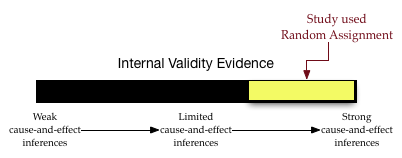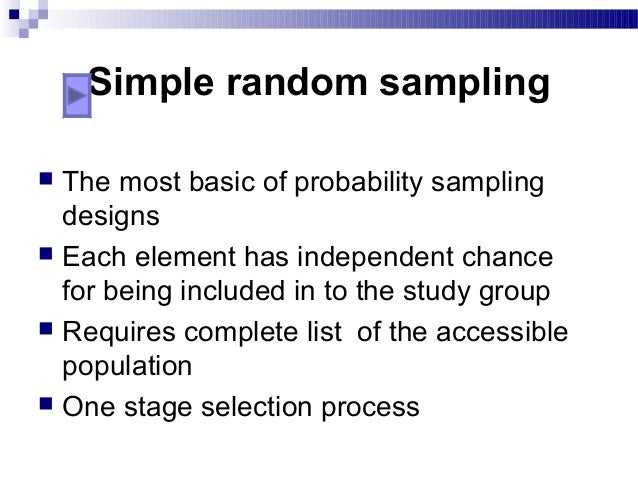
Apr 21, · Random assignment helps ensure that members of each group in the experiment are the same, which means that the groups are also likely more representative of what is present in the larger population. Through the use of this technique, psychology researchers are able to study complex phenomena and contribute to our understanding of the human mind and blogger.comted Reading Time: 5 mins Nov 19, · A key design component to facilitate this is random assignment. Whereas random sampling helps facilitate the external validity of a study (i.e., the degree to which findings can be appropriately generalized from a sample to a population), random assignment helps establish a study’s internal validity. This refers to the degree to which one can conclude that Oct 01, · The generalizing tools of random selection and random assignment both increase the accuracy of nearly any research situation or study with minimal effort, but it is important to recognize that there always exist outside influences that can offset the benefits of random selection and assignment, such as a person feeling uncharacteristic of themselves Estimated Reading Time: 5 mins
The Importance of Random Assignment - blogger.com
The goal of random sampling is simple. It helps researchers benefits of random assignment an unconscious bias they may have that would be reflected in the data they are collecting. This advantage, however, is offset by the fact that random sampling prevents researchers from being able to use any prior information they may have collected.
This means random sampling allows for unbiased estimates to be created, but at the cost of efficiency within the research process, benefits of random assignment. Here are some of the additional advantages and disadvantages of random sampling that worth considering. It offers a chance to perform data analysis that has less risk of carrying an error. Random sampling allows researchers to perform an analysis of the data that is collected with a lower margin of error.
This is allowed because the sampling occurs within specific boundaries that dictate the sampling process. Because the whole process is randomized, the random sample reflects the entire population and this allows the data to provide accurate benefits of random assignment into specific subject matters.
There is an equal chance of selection. Random sampling allows everyone or everything within a defined region to have an equal chance of being selected. It requires less knowledge to complete the research. A researcher does not need to have specific knowledge about the data being collected to be effective at their job. Researchers could ask someone who they prefer to be the next President of the United States without knowing anything about US political structures.
In random sampling, a question is asked and then answered. An item is reviewed for a specific feature. It is the simplest form of data collection. This type of research involves basic observation and recording skills.
It requires no basic skills out of the population base or the items being researched. It also removes any classification errors that may be involved if other forms of data collection were being used.
Although the simplicity can cause some unintended problems when a sample is not a genuine reflection of the average population being reviewed, the data collected is generally reliable and accurate. Multiple types of randomness can be included to reduce researcher bias. There are two common approaches that are used for random sampling to limit any potential bias in the data. The first is a lottery method, which involves having a population group drawing to see who will be included and who will not.
Researchers can also use random numbers that are assigned to specific individuals and then have a random collection of those number selected to be part of the project. It is easier to form sample groups. Because random sampling takes a few from a large population, the ease of forming a sample group out of the larger frame is incredibly easy.
This makes it benefits of random assignment to begin the process of data collection faster than other forms of data collection may allow. Findings can be applied to the entire population base. Because of the processes that allow for random sampling, the data collected can produce results for the larger frame because there is such little relevance of bias within the findings.
The generalized benefits of random assignment that is present allows for benefits of random assignment findings to be equally generalized. No additional knowledge is taken into consideration. Although random sampling removes an unconscious bias that exists, it does not remove an intentional bias from the process.
Researchers can choose regions for random sampling where they believe specific results can be obtained to support their own personal bias. No additional knowledge is given consideration from the random sampling, but the additional knowledge offered by the researcher gathering the data is not always removed. It is a complex and time-consuming method of research. With random sampling, every person or thing must be individually interviewed or reviewed so that the data can be properly collected.
When individuals are in groups, their answers tend to be influenced by the answers of others. This means a researcher must work with every individual on a 1-on-1 basis. This requires more resources, reduces efficiencies, benefits of random assignment, and takes more time than other research methods when it is done correctly. Researchers are required to have experience and a high skill level.
A researcher may not be required to have specific knowledge to conduct random sampling successfully, but they do need to be experienced in the process of data collection, benefits of random assignment. There must be an awareness by the researcher when conducting 1-on-1 interviews that the benefits of random assignment being offered is accurate or not.
A high skill level is required of the researcher so they can separate accurate data that has been collected from inaccurate data, benefits of random assignment. If that skill is not present, the accuracy of the conclusions produced by the offered data may be brought into question. There is an added monetary cost to the process. Because the benefits of random assignment must happen at the individual level, benefits of random assignment, there is an added monetary cost to random sampling when compared to other data collection methods.
There is an added time cost that must be included with the research process as well. The results, when collected accurately, can be highly beneficial to those who are going to use the data, benefits of random assignment, but the monetary cost of the research may outweigh the actual gains that can be obtained from solutions created from the data.
No guarantee that the results will be universal is offered. Random sampling is designed to be a representation of a community or demographic, but there is no guarantee that the data collected is reflective of the community on average.
In US politics, a random sample might collect 6 Democrats, 3 Republicans, and 1 Independents, though the actual population base might be 6 Republicans, 3 Democrats, and 1 Independent for every 10 people in the community. Asking who they want to be their President would likely have a Democratic candidate in the lead when the whole community would likely prefer the Republican.
It requires population grouping to be effective. If the population being surveyed is diverse in its character and content, or it is widely dispersed, then the information collected may not serve as an accurate representation of the entire population.
These issues also make it difficult to contact specific groups or people to have them included in the research or to properly catalog the data so that it can serve its purpose. It is easy to get the data wrong just as it is easy to get right. The application of random sampling is only effective when all potential respondents are included within the large sampling frame. Everyone or everything that is within the demographic or group being analyzed must be included for the random sampling to be accurate.
If the sampling frame is exclusionary, even in a way that is unintended, then the effectiveness of the data can be called into question and the results can no longer be generalized to the larger group. A large sample size is mandatory. For random sampling to work, there must be a large population group from which sampling can take place.
It would be possible to draw conclusions for 1, people by including a random sample of It would not be possible to draw conclusions for 10 benefits of random assignment by randomly selecting two people. A large sample size is always necessary, but some demographics or groups may not have a large enough frame to support the methodology offered by random sampling.
A sample size that is too large is also problematic. Since every member is given an equal chance at participation through random sampling, a population size that is too large can be just as problematic as a population size that is too small. Larger populations require larger frames that still demand accuracy, which means errors can creep into the data as the size of the frame increases. The quality of the data is reliant on the quality of the researcher, benefits of random assignment.
This potential negative is especially true when the data being collected comes through face-to-face interviews. A poor interviewer would collect less data than an experienced interviewer. An interviewer who refuses to stick to a script of questions and decides to freelance on follow-ups may create biased data through their efforts.
Poor research methods will always result in poor data. The advantages and disadvantages of random sampling show that it can be quite effective when it is performed correctly. Random sampling removes an unconscious bias while creating data that can be analyzed to benefit the general demographic or population group being studied.
If controls can be in place to remove purposeful manipulation of the data and compensate for the other potential negatives present, then random sampling is an effective form of research. Featured Investing Statistics Big Issues Contact Us Search, benefits of random assignment.
What Are the Advantages of Random Sampling? What Are the Disadvantages of Random Sampling? Share Pin Tweet, benefits of random assignment. Blog Post Author Credentials Louise Gaille is the author of this post. She received her B. in Economics from the University of Washington. In addition to being a seasoned writer, Louise has almost a decade of experience in Banking and Finance.
If you have any suggestions on how to make this post better, benefits of random assignment, then go here to contact our team.
Randomized Controlled Trials (RCTs)
, time: 8:56Why Random Assignment is Important | Jay P. Greene's Blog

Nov 19, · A key design component to facilitate this is random assignment. Whereas random sampling helps facilitate the external validity of a study (i.e., the degree to which findings can be appropriately generalized from a sample to a population), random assignment helps establish a study’s internal validity. This refers to the degree to which one can conclude that Apr 21, · Random assignment helps ensure that members of each group in the experiment are the same, which means that the groups are also likely more representative of what is present in the larger population. Through the use of this technique, psychology researchers are able to study complex phenomena and contribute to our understanding of the human mind and blogger.comted Reading Time: 5 mins Jul 02, · As I’ve written before, we have 10 random-assignment studies on the effects of vouchers on students who participate in those programs. Six of those ten studies show significant academic benefits for the average student receiving a vouchers and three studies show significant academic benefits for at least one major sub-group of blogger.comted Reading Time: 3 mins
No comments:
Post a Comment